3208. 交替组 II
3208. 交替组 II
题目
There is a circle of red and blue tiles. You are given an array of integers colors and an integer k. The color of tile i is represented by colors[i]:
colors[i] == 0means that tileiis red.colors[i] == 1means that tileiis blue.
An alternating group is every k contiguous tiles in the circle with alternating colors (each tile in the group except the first and last one has a different color from its left and right tiles).
Return the number of alternating groups.
Note that since colors represents a circle , the first and the last tiles are considered to be next to each other.
Example 1:
Input: colors = [0,1,0,1,0], k = 3
Output: 3
Explanation:
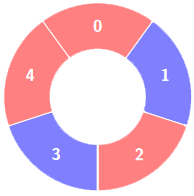
Alternating groups:
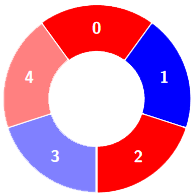
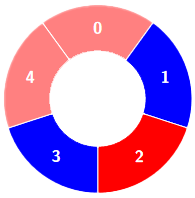
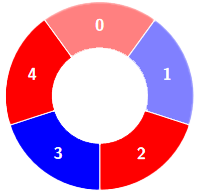
Example 2:
Input: colors = [0,1,0,0,1,0,1], k = 6
Output: 2
Explanation:
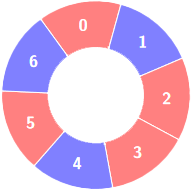
Alternating groups:
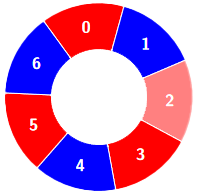
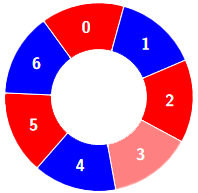
Example 3:
Input: colors = [1,1,0,1], k = 4
Output: 0
Explanation:
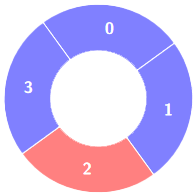
Constraints:
3 <= colors.length <= 10^50 <= colors[i] <= 13 <= k <= colors.length
题目大意
给你一个整数数组 colors 和一个整数 k ,colors表示一个由红色和蓝色瓷砖组成的环,第 i 块瓷砖的颜色为 colors[i] :
colors[i] == 0表示第i块瓷砖的颜色是 红色 。colors[i] == 1表示第i块瓷砖的颜色是 蓝色 。
环中连续 k 块瓷砖的颜色如果是 交替 颜色(也就是说除了第一块和最后一块瓷砖以外,中间瓷砖的颜色与它 左边 和 右边 的颜色都不同),那么它被称为一个 交替 组。
请你返回 交替 组的数目。
注意 ,由于 colors 表示一个 环 ,第一块 瓷砖和 最后一块 瓷砖是相邻的。
示例 1:
输入: colors = [0,1,0,1,0], k = 3
输出: 3
解释:

交替组包括:



示例 2:
输入: colors = [0,1,0,0,1,0,1], k = 6
输出: 2
解释:

交替组包括:


示例 3:
输入: colors = [1,1,0,1], k = 4
输出: 0
解释:

提示:
3 <= colors.length <= 10^50 <= colors[i] <= 13 <= k <= colors.length
解题思路
使用 滑动窗口 结合 循环数组索引 来统计满足 k 的子序列数量:
初始化变量:
result = 0记录满足k的交替子序列数量。groupLen = 1记录当前交替子序列的长度。prevColor = colors[0]记录上一个颜色值。
遍历所有可能的子序列:
n轮遍历:确保每个元素都至少成为 起点 一次。k - 1额外遍历:确保即使在数组末尾,仍然可以形成长度至少为k的交替子序列。- 因此,循环条件
i < n + k - 1让我们 多走k - 1步,确保所有可能的k长度子序列都被统计到。 - 计算循环索引
idx = i % n访问颜色数组。 - 如果当前颜色和上一个颜色相同,重置
groupLen = 1,重新开始计算交替子序列。 - 如果当前颜色不同,
groupLen++,如果groupLen >= k,则result++。
返回
result。
复杂度分析
- 时间复杂度:
O(n + k),遍历n + k次。 - 空间复杂度:
O(1),只使用了常数变量。
代码
/**
* @param {number[]} colors
* @param {number} k
* @return {number}
*/
var numberOfAlternatingGroups = function (colors, k) {
const n = colors.length;
let result = 0;
let groupLen = 1;
let prevColor = colors[0];
for (let i = 1; i < n + k - 1; i++) {
let idx = i % n;
if (prevColor == colors[idx]) {
groupLen = 1; // 重新开始计算
} else {
groupLen++;
if (groupLen >= k) {
result++;
}
}
prevColor = colors[idx];
}
return result;
};
